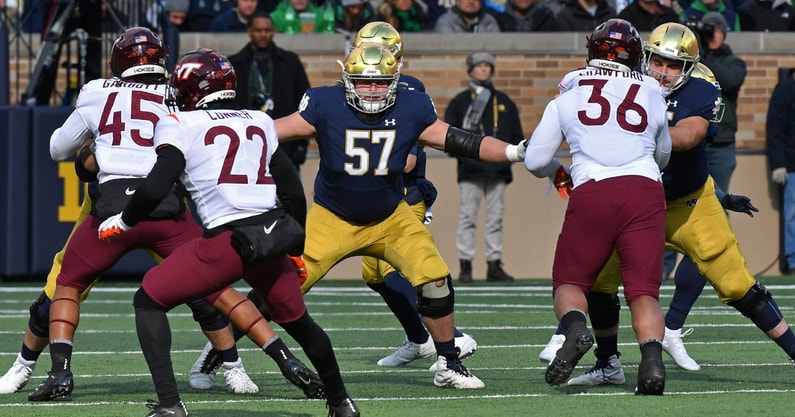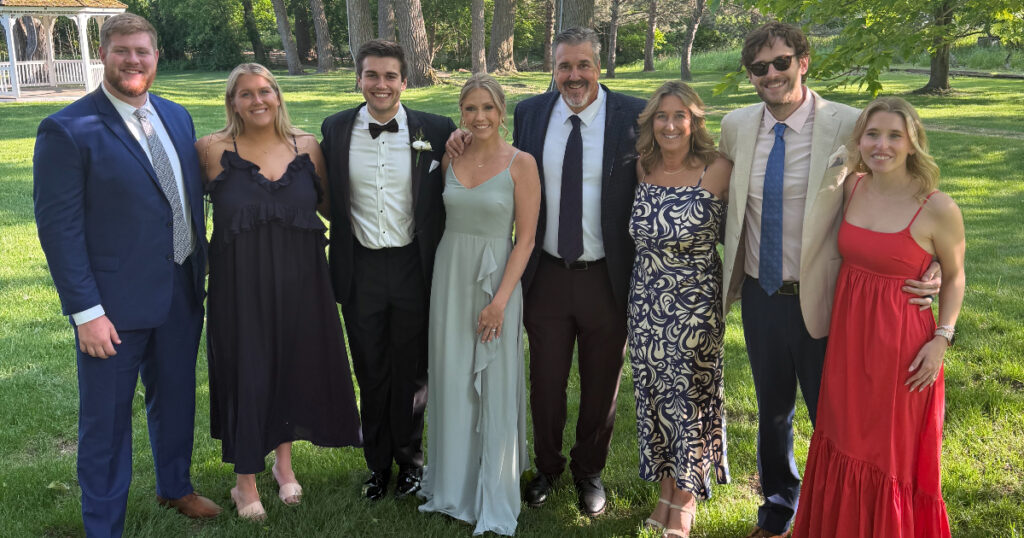How Trevor Ruhland's journey helped redefine life after football

Editor’s Note: This is the third in a three-part series from former Notre Dame offensive lineman Trevor Ruhland (2015-19). He shared with Blue & Gold his perspective on the physical aftermath of his college football career, finding purpose in the working world, his ongoing relationship with the game and much more.
Follow these links to read Part 1 and Part 2. Read Part 3, in his own words, below.
It’s weird how sports fandom shifted for me.
When you’re in it, truly in the trenches, it’s not really about being a fan of the game itself, at least not in the same way. You’re a fan of your team, your brothers, your own performance. You live and breathe the minutiae of practice and game plans.
Once I was out, watching games felt different. Sometimes, I’d catch myself analyzing plays, seeing the game through the offensive linemen’s eyes, remembering the feel of the turf, the smell of sweat and grass.
But other times, it just felt … distant. Like watching a movie you used to be a character in. There’s a bittersweetness to it. You miss it like hell, but you also know the cost. You see your old teammates, still battling, and a part of you aches to be there, but another part is grateful for the quiet.
The roaring crowd, the electric atmosphere — it’s all still there, but it’s no longer my roar, my electricity. It’s theirs.
Watching NFL careers from afar
It’s a strange feeling, seeing my friends still playing. Some are in the NFL, living out the dream we all chased. I watch them on Sundays, recognizing their numbers, remembering the way they moved, the intensity in their eyes.
There’s a part of me that feels a pang of something — not exactly jealousy, but a ghost of the life I could have had. Then there’s the other side: the knowledge of the physical toll, the constant pain, the brutal schedule, the endless pressure. I know what they’re sacrificing, because I lived it.
I see their successes, and I cheer them on, genuinely. But I also see the hits they take, the injuries, the constant grind, and I realize that my path, while unexpected and incredibly difficult, has also given me something invaluable: a different kind of freedom, a chance to rebuild on my own terms. We shared a chapter, a monumental one, and now our books have diverged. And that’s OK.
Feeling disconnected with former teammates
It’s a delicate dance, trying to maintain those relationships with guys still grinding in the NFL. You become incredibly mindful of their time, of their focus. You don’t want to be a bother, another distraction in a world that demands absolute dedication. So, you pull back, sometimes out of respect, sometimes out of a quiet fear of being irrelevant.
That pulling back, as necessary as it might feel, has a cost. My relationships with my college teammates, these guys who were closer than brothers for years, have felt like they’ve been growing cold and distant. The constant communication, the shared experience of daily pain and triumph, it just fades.
When we get together at weddings or other rare occasions, there’s this initial nervousness. It’s like seeing strangers at first, these familiar faces attached to lives that have become so different from mine.
You shake hands, offer polite greetings, and there’s an awkwardness that hangs in the air, a sense of trying to find the old rhythm. But then, slowly, as the night wears on and the stories start flowing, the walls come down.
We warm back up to one another, picking up inside jokes from years ago, remembering moments only we shared. It’s a relief when that connection reignites, a reminder of the bond that time and distance can’t completely erase.
The hardest part, though, is trying not to compare my life to theirs. I love my life now, truly. I wouldn’t trade the peace I’ve found, or the love of my wife, for anything. I know I’m just as blessed, perhaps even more so, in ways that matter most to me now.
But it’s impossible to completely shut off that part of your brain. You see their success, the headlines, the highlights, the financial security, and a quiet voice in the back of your head whispers, “What if?” What if I hadn’t gotten sick? What if my body hadn’t revolted?
The “what could have been” is a potent thought, and while I logically know my path was meant to be, the emotional side of it sometimes feels like a punch to the gut. It’s a battle to celebrate their wins wholeheartedly without letting it diminish my own.
And then there’s the practical challenge of trying to keep in touch with everyone when they’re spread out around the country and are super busy. A text might go unanswered for days, a call unreturned.
You tell yourself it’s because they’re in meetings, or practice, or just exhausted from the grind, and usually, that’s the truth. But sometimes, you can’t help but wonder if you’re just not a priority anymore, or if the connection isn’t as strong as it used to be.
Top 10
- 1Hot
Freeman on BK
The outside games that could decide Notre Dame's playoff fate
- 2Trending
Irish Intel
Behind-the-scenes rumblings on Notre Dame’s freshmen on defense
- 3
Injury report
Notre Dame football injury report: Starter questionable vs. Boston College due to concussion
- 4
Freeman before BC
Everything Notre Dame coach Marcus Freeman said in Boston College week news conference
- 5
Hey Horka!
Is Notre Dame in its best position since Lou Holtz with Marcus Freeman?
Get the Daily On3 Newsletter in your inbox every morning
By clicking "Subscribe to Newsletter", I agree to On3's Privacy Notice, Terms, and use of my personal information described therein.
I sometimes felt like a burden to some of them, especially around big life events, like my bachelor party. I saw glances, heard subtle tones, that made me feel like some guys didn’t really want to be there, like it was more of an obligation than a celebration of our friendship.
It’s a strange, isolating feeling when you’re supposed to be surrounded by your closest friends, but you sense a disconnect, a lack of genuine enthusiasm. It makes you question the depth of the bond, or at least how much it has changed.
These aren’t the guys I sweated with, bled with, celebrated with, every single day anymore. They’re still my brothers, but the landscape of our brotherhood has shifted dramatically, and navigating that new terrain is a constant work in progress.
WATCH: Trevor Ruhland joins this week’s Third & Gold Podcast
Learning how to redefine my life
Looking back now, the journey feels both impossibly long and startlingly swift. The roar of Notre Dame Stadium, the brutal demands of the offensive line, the silent, insidious battle with an eating disorder, the ache of losing an identity, and the slow, arduous climb back to health — all these chapters have shaped me into the man I am today.
I’ve learned that strength isn’t always about benching 400 pounds or pushing through another grueling practice. True strength, I’ve come to understand, lies in vulnerability, in asking for help when you’re weak, and in the quiet, daily courage to face your demons head-on.
My life now doesn’t have the grand, public scoreboard it once did, but its victories are infinitely more profound. They’re found in the unwavering love of my wife, Nina, who stood by me when I couldn’t stand for myself, whose belief in me was the steady hand that guided me out of the darkness. They’re in the deep, unbreakable bonds with my family and friends, who saw beyond my struggles to the person I was, and the person I was striving to be.
Every shared laugh, every quiet moment of connection, every step towards building a home and a future with Nina — these are the true trophies of my life now.
The path forward isn’t always smooth. The physical toll of the game remains a constant companion, and the shadows of past struggles sometimes flicker at the edges of my mind. But the discipline that once drove me to push through pain on the field now fuels my commitment to well-being, to balanced living, and to nurturing the relationships that truly matter.
I’m not the same person I was five years ago, or 10. I’m a man who has walked through fire and found a new purpose, a new definition of success that is rooted in gratitude, in love, and in simply being present for the life I’m building.
The goal of writing all this was to put my thoughts together, to untangle the knots in my head. I needed to understand what my purpose was now that my old one was gone.
I found that the purpose wasn’t something to be found in a new job title or a new athletic feat. It was right there, buried beneath all the pain. The struggles with my weight, the physical injuries, the emotional toll on my family — all of it felt like a curse for a long time.
But I’m starting to see it differently. I’m beginning to believe that the true purpose of all that pain wasn’t to punish me, but to prepare me. It taught me empathy, it taught me humility, and it taught me what truly matters.
